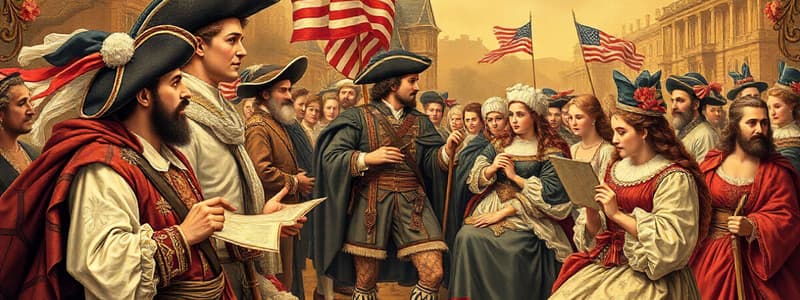Podcast
Questions and Answers
How did John Locke's philosophy influence the Declaration of Independence?
How did John Locke's philosophy influence the Declaration of Independence?
John Locke's ideas about natural rights and government by consent were foundational in shaping the Declaration of Independence, emphasizing individual liberty and the right to revolt against oppressive rule.
What were the key reasons for the colonists' opposition to the Stamp Act?
What were the key reasons for the colonists' opposition to the Stamp Act?
The colonists opposed the Stamp Act because it imposed direct taxes without their consent, violating the principle of 'no taxation without representation.'
What impact did the Boston Tea Party have on British colonial policy?
What impact did the Boston Tea Party have on British colonial policy?
The Boston Tea Party led to the Coercive Acts, reshaping British policy by increasing punitive measures against the colonies, further escalating tensions.
Explain the significance of the Battle of Saratoga in the American Revolutionary War.
Explain the significance of the Battle of Saratoga in the American Revolutionary War.
What were the main weaknesses of the Articles of Confederation?
What were the main weaknesses of the Articles of Confederation?
Flashcards are hidden until you start studying
Study Notes
Key Historical Figures
- John Locke: Influential Enlightenment thinker known for ideas on natural rights and government by consent, impacting American revolutionary thought.
- King George III: Monarch of Great Britain during the American Revolutionary War, often criticized for oppressive policies toward the colonies.
- George Washington: Commander of the Continental Army and later the first President of the United States, pivotal in leading the colonists to victory.
Legislative Acts and Colonial Response
- Sugar Act and Currency Act: Tax measures imposed in 1764 that regulated sugar trade and currency use in the colonies, engendering dissent among colonists.
- Stamp Act: 1765 legislation requiring colonial purchase of stamped paper for documents and cards, leading to widespread protests and the rallying cry of "no taxation without representation."
- Townshend Acts: Series of acts in 1767 that taxed imports like tea, glass, and paper, increasing tensions and resulting in boycotts and protests.
Colonial Unity and Resistance
- Homespun: A movement encouraging the production of homemade goods to avoid dependence on British imports, symbolizing resistance.
- Committees of Correspondence: Networks formed to facilitate communication and coordination among colonies, enhancing collective resistance to British policies.
Key Events of Dissent
- Boston Massacre: 1770 incident where British troops fired on civilians, escalating anti-British sentiment and serving as a catalyst for revolutionary fervor.
- Boston Tea Party: 1773 protest against the Tea Act where colonists dumped British tea into Boston Harbor, demonstrating resistance to taxation without representation.
- Coercive Acts: Also known as Intolerable Acts, a series of punitive measures enacted in 1774 in response to the Boston Tea Party, further uniting the colonies against British rule.
Emergence of American Governance
- Continental Congress: Convened in 1774 to organize colonial resistance, becoming the governing body during the Revolutionary War.
- Lexington and Concord: Sites of the first military engagements of the Revolutionary War in 1775, marking the beginning of open conflict between Britain and the colonies.
Revolutionary Ideals
- Common Sense: Pamphlet by Thomas Paine published in 1776 advocating for independence from Britain, influencing public opinion toward revolutionary action.
- Declaration of Independence: Document adopted on July 4, 1776, articulating the colonies' reasons for seeking independence and asserting natural rights.
Major Military Engagements
- Battle of Saratoga: 1777 turning point in the war, resulting in a significant American victory that prompted French support for the revolution.
- Battle of Yorktown: Final major battle in 1781 where British surrender led to the end of the Revolutionary War.
Post-War Governance
- Articles of Confederation: First governing document of the United States, ratified in 1781, establishing a weak central government and highlighting the need for a stronger federal system.
- Loyalists: Colonists who remained loyal to the British crown, facing persecution and social upheaval in the wake of independence.
Contextual Overview
- The events listed showcase the trajectory from discontent with British rule to the establishment of a sovereign nation, highlighting key figures, legislative actions, and significant battles that shaped the foundation of the United States.
Studying That Suits You
Use AI to generate personalized quizzes and flashcards to suit your learning preferences.




